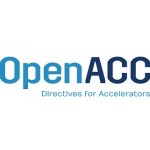“This is the first in a series of short videos to introduce you to parallel programming with OpenACC and the PGI compilers, using C++ or Fortran. You will learn by example how to build a simple example program, how to add OpenACC directives, and to rebuild the program for parallel execution on a multicore system. To get the most out of this video, you should download the example programs and follow along on your workstation.”
Search Results for: OpenACC
Five Reasons Why you Want to Try OpenACC – Starting with “Its Free!”
OpenACC is a directive based programming model that gives C/C++ and Fortran programmers the ability to write parallel programs simply by augmenting their code with pragmas. Pragmas are advisory messages that expose optimization, parallelization, and accelerator offload opportunities to the compiler so it can generate efficient parallel code for a variety of different target architectures including AMD and NVIDIA GPUs plus ARM, x86, Intel Xeon Phi, and IBM POWER processors.
OpenACC Gains Momentum in 2016
The OpenACC standards group today announced several major milestones including the addition of new member, the National Supercomputing Center in Wuxi, the adoption of OpenACC by several major HPC applications, the addition of support for new target platforms and expanded implementation
OpenACC Building Momentum going into GTC
Today the OpenACC standards group announced a set of additional hackathons and a broad range of learning opportunities taking place during the upcoming GPU Technology Conference being held in San Jose, CA April 4-7, 2016. OpenACC is a mature and performance-portable path for developing scalable parallel programs across multi-core CPUs, GPU accelerators or many-core processors.
OpenACC 2.5 Includes Support for ARM and x86 Processors
The OpenACC Standards Group released the 2.5 version of the OpenACC API specification.
PGI Accelerator Compilers Add OpenACC Support for x86
“Our goal is to enable HPC developers to easily port applications across all major CPU and accelerator platforms with uniformly high performance using a common source code base,” said Douglas Miles, director of PGI Compilers & Tools at NVIDIA. “This capability will be particularly important in the race towards exascale computing in which there will be a variety of system architectures requiring a more flexible application programming approach.”
OpenACC Toolkit is now Free for Academia
Over at the Nvidia Blog, Paresh Kharya writes that the company is releasing its OpenACC Toolkit as a free download for Academia.
Video: Porting Scientific Apps to GPUs with OpenACC
In this video from the GPU Technology Conference, Saber Feki from KAUST and Ahmed Al-Jarro from Fujitsu Labs in Europe present: Experiences in Porting Scientific Applications to GPUs Using OpenACC.
Video: Porting Physics Apps to Titan with OpenACC
In this video, Aaron Vose from Cray presents: Porting Computational Physics Applications to the Titan Supercomputer with OpenACC and OpenMP.
Comparing OpenACC and OpenMP Performance and Programmability
“OpenACC and OpenMP provide programmers with two good options for portable, high-level parallel programming for GPUs. This talk will discuss similarities and differences between the two specifications in terms of programmability, portability, and performance.”









